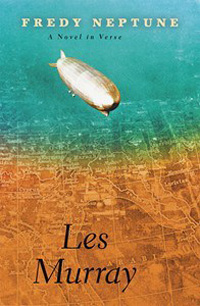by
Murray Jennings
A quote from Garrison Keillor as the entry point to a collection of poems is indication enough
that what follows is bound to take the reader out of body and into mystery, for a considerable
part of the time: ‘I wanted to live several lives, which meant abandoning some.’
The cover painting, ‘Man and Cow with Mask’, by Quint Buchholz, is quite startling and
bears some relationship to the Keillor quote. The man is concealing his face behind a coyote-
head mask as he encounters a black cow upon whose head someone has placed a white
teatro mask of tragedy. Why?
To seek the answer I went straight to the collection’s title poem. And I confess, I was lost
from the outset.
To explain: The book is divided into six sections. Section III, ‘Coyote Barks Music at the
Moon’, contains a number of groups of poems, the first of which is ‘Trickster’, which in turn,
encompasses nine sub-poems (my term) that explore elements of Native American
mythology. And the first of these, ‘Identity’ has Coyote saying
‘I am contradiction /
somewhere on ladder from man to god...’ and closing with
‘I cannot help but give you / tease
you leaven you / with my greatest gift: / con- / fusion’
For which I am grateful, because I remain confused by much of the entire section, while
simultaneously marvelling at the richness of the language as Coyote, Wolf and Trickster
weave words around creation, fire, life, song, dance and death. However, I am comforted in
my confusion by the opening lines of ‘Shadow Play, one of the poems following ‘Trickster’.
‘Relax: it is only midnight. / You have centuries until daybreak / for the story to
unfold.’
I will persevere. As should anyone else who picks up this book.
Elsewhere in the collection, the poet explores mythologies in places as far apart as Japan and
Spain. He draws on art, music, travel, love, sex, relationships between people and their
relationships with certainties and the unknowable.
Shane McCauley is living his ‘several lives’, and letting us in on many aspects and
experiences. He is not afraid to go naked in our presence.
Like me, other readers will be seduced out of the present, to step through various framed
transparencies into other times, as in ‘Ostia Antica’, where the poet urges us to
‘Leave your
21st century shoes at the gate / and stroll without a watch...’ You are down near the mouth of
the River Tiber, but you are no coach-trip tourist; you are an amateur scholar, a romantic,
drinking it all in from 2,000 years ago, head still spinning from your time in Rome.
Because I am not a serious scholar, this was not intended to be a book review. I have been
asked for what are, simply, one reader’s impressions. I will mention just a few of the many
poems which, for various reasons, leap out at me, calm me, delight me, and inform me. And
like me, I am certain that many other readers will be seduced out of the present and our
imposed clockwork lives, into the mind and heart of an exceptional poet.
From the first section, ‘Wind-spooked’ will delight all cat-lovers, as a brilliant, observational
piece describing the actions of a cat retreating from the wind and rain.
‘Hives in Winter’ is a tightly-constructed, highly-imaginative description of a community
(‘the village’) of bees. The opening line is surely an original, the reversal of an image:
‘Middle winter mist rises like dry ice’.
In ‘Serenity’, the poet talks of the high stranded moon at dawn,
‘as if made of gauze...beneath
it / all the weary tumult of the earth / fitful / and just about to wake.’ As a poet myself, I
would have had trouble coming up with something so new to say about the moon and its
effects on us. And what a line!
‘All the weary tumult of the earth’, encompassing so much of
what goes on down here, without even a hint of a specific. He leaves that up to us.
The moon and another cat make brief appearances in section II, ‘Pine Trees in the Rain’,
fifteen poems devoted to Japan. ‘Autumn Moon at Tama River’ has the moon described as
‘blatant / and full as a drunkard, resting on a tree top'. Yes! I’ve seen it like that. And I’ve
seen pollen on a cat’s fur, mentioned in ‘Spring is a Cat’, but then the poet takes flight into
the final couplet, ‘Spring’s emerald life leaps / and romps on a cat’s long whiskers.’ It’s in
such stretches of a poet’s imagination that we are gently transported into dimensions of sheer
delight.
In several of the sections there are love poems, of which several are at least faintly erotic,
sensual, even sexual; but never gratuitous in their references. ‘This is the Photo’ is such a
gentle poem, but even in one simple, three-line stanza, the physical sensuality is evoked
beautifully.
‘and your eyes / even when closed / how I swim under your lids...’
In ‘Three’s a Crowd’, there is comedy. And a tragedy of sorts, at the expense of the narrator.
The elephant in the bedroom is actually a parrot! The bird simply has to go! And once it’s
ejected, you’d expect the love-making to commence...
Eros is present also, in ‘Fig’, an extraordinarily clever, short, highly sensual, visual poem,
about which I’ll say no more, except that it could well evoke a heavy sigh from a hetero male.
I have mentioned earlier, being informed by many of the poems in this collection. Not as
overtly as a lesson might, but by names, references, paths from one idea to another, and so
on. For example, the poem, ‘Holderlin’s Room’ and the one on its facing page, ‘Pallaksch’,
stopped me in my tracks. Who is this Holderlin? (with an umlaut over the ‘o’).
I looked him up in my Dictionary of Writers. Briefly, Johann Holderlin (1770 – 1843) was a
German poet who studied philosophy and theology, suffered from schizophrenia, spent a year
of his mid-thirties in an asylum, and whose greatness was not recognised until 80 years after
his death, when Rainer Rilke and others alerted the German public to his worth. So here is
Shane McCauley in Frankfurt, visiting a room once occupied by Holderlin in isolation,
sketching in spare poetics, some aspects of the German’s life and thoughts and commenting
that ‘...madness / is something / only others see.’
The other piece of information, gleaned from the poem opposite, is the meaning of its title,
‘Pallaksch’, revealed as a footnote. It is Holderlin’s invented word meaning: yes and no.
When I thought about that, it seemed logical that there should be such a word. I read the
poem only after pondering the footnote.
‘Pallaksch’ is deceptively simple in its presentation down the page. You can read it in
seconds. But to do that is to ignore what it is intended to unlock and free up in your mind.
Read it slowly, aloud, from the opening lines: ‘with this one word / all wrong answers / a
thing of the past / all mysteries solved...’ down through a list of unfinished questions such as
‘is there life after’ and ‘do you take this woman’ down to an open ending, whereupon you are
immediately drawn back to the beginning, to perhaps re-think your previous conclusions.
Brilliant!
I could name many more of these poems which have gripped, surprised, or amused me. After
all, there are 125 to choose from. I could quote verbatim some haiku, or trace a route through
some of the poet’s places and experiences close to home, in Australia. I could point out some
of the many subtle, unforced rhymes. Perhaps a practised reviewer might do some of that, but
there is always the risk of saying too much and spoiling it for readers intent on discovering
the delights for themselves.
Instead, I will mention just two more:
‘Beside My Brother’s Grave’ is without doubt, one of the most moving poems I have read,
related to the death of someone close.
The final poem, ‘Larvatus Prodeo’, has the poet wearing a mask ‘...grafted so perfectly / I
forget I ever looked otherwise...’, advancing beneath a ‘harmless concealment’? Or
‘...otherwise / naked and failed’..’.running gibbering / from life’s heat / into mist / into
dissolving sleet.’
Shane McCauley may have been speaking personally there, but I don’t think so. It seems to
me that this concealment behind the mask has been his way of advancing ‘naked and
successfully’ into the upper grouping of contemporary Australian poets.
tRickster is his 8th collection of poems and deserves recognition throughout this country and
far beyond, as a superb contribution to Australian literature.
Murray Jennings
26 / 07 / 2015




























